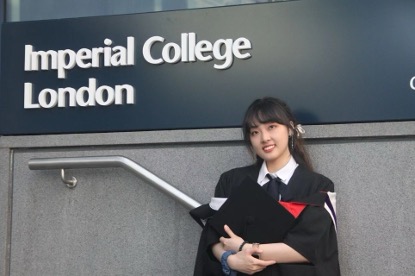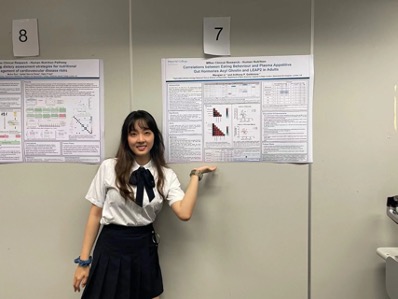Wanqian Li - MRes Clinical Research (Human Nutrition)
 What attracted you to the MRes in Clinical Research?
What attracted you to the MRes in Clinical Research?
After I had studied in the field of human nutrition for four years during my undergraduate, I had a big interest in how the contents I learned from lectures and textbooks can relate to a real situation. Additionally, I want to gain more hands-on experience. That’s why I applied to MRes in clinical research.
What specific area did you focus on for your project?
My final project focused on the correlations between Eating Behaviour and Plasma Appetitive Gut Hormones Acyl Ghrelin and LEAP2 in Adults, so I handled a relatively large amount of data for that. Meanwhile, I also had a chance to help in a clinical trial run by the same research group, which was looking at the relationship between meal size, LEAP2 (a newly founded gut hormone) and other indicators related to appetite (ex. food spatial memory)
What aspects of this programme did you find the most beneficial?
One of the primary benefits of the program is the opportunity to develop advanced research skills. I obtained advanced experience in research methodologies, study design, data analysis techniques, and scientific writing, which are essential for conducting high-quality research in clinical settings.
Additionally, MRes programs provided me with opportunities to gain practical experience through hands-on research projects and clinical trials. This practical experience allows me to apply theoretical knowledge in real-world settings and develop practical skills.
Last but not least, the networking opportunities. I have met many lovely master's students, faculty members, researchers, and professionals in the field. I was so grateful to meet these people as everyone here is supportive, and their diverse backgrounds and experiences have enriched my learning journey. Engaging with such a supportive community has not only expanded my professional network but also provided me with valuable insights, perspectives, and collaborative opportunities that have enhanced my academic and career growth.
How do you think the course will impact your future career?
Completing the course significantly enhanced my future career prospects by providing specialized knowledge, practical skills, and networking opportunities. It qualifies me for advanced roles in clinical research, academia, or other health-related fields. Meanwhile, it also increased my competitiveness in the job market.
What did you enjoy most about studying at Imperial and in the Faculty of Medicine?
Studying at Imperial College London, particularly in the Faculty of Medicine, a top-tier faculty, offered me cutting-edge research opportunities and mentorship. Additionally, the diverse and dynamic community fosters collaboration and cross-cultural understanding, while the central London location provides access to abundant resources and networking opportunities. I really enjoy the supportive academic environment, coupled with dedicated faculty and staff, which contributes to a positive and rewarding learning experience.
What have you done since completing the MRes?
I went back to China and joined a biotechnical company. Recently focusing on the potential benefits of food ingredients which can be used as supplements such as BHB, beta-alanine and ergothioneine.
 What advice would you give those considering the MRes in Clinical Research?
What advice would you give those considering the MRes in Clinical Research?
Before pursuing an MRes in Clinical Research, clarify your interests as well as career goals and ensure the program aligns with them. Research the program's accreditation, faculty expertise, and opportunities for practical experience. Stay organized, manage your time effectively, and seek support when needed. Prioritize networking, stay motivated, and remain persistent in your studies to succeed in this intellectually stimulating but challenging field.
In short, if you are interested in applying theoretical knowledge to a real-word situation and getting some hands-on experience about clinical trials, definitely come!
Find out more and apply to study Imperial's MRes Clinical Research.